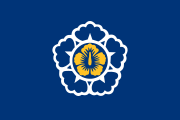Lee Nak-yon
Lee Nak-yon (Korean: 이낙연; Hanja: 李洛淵; born 20 December 1951),[1][2][3] also known as Lee Nak-yeon, is a South Korean politician who was the 41st Prime Minister of South Korea.[4][5] He is also the longest serving prime minister of South Korea since the Constitution of South Korea was last revised in 1987.[6] He previously served as the governor of Jeollanam-do (South Jeolla) province, a stronghold of his party.[4] Before serving as governor, he worked as a journalist for the Dong-a Ilbo and served as a member of the National Assembly for four terms.
Lee Nak-yon | |
|---|---|
이낙연 | |
_(cropped).jpg) | |
| Member of the National Assembly | |
| Assumed office 30 May 2020 | |
| Preceded by | Chung Sye-kyun |
| Constituency | Jongno-gu |
| In office 30 May 2000 – 15 May 2014 | |
| Preceded by | Kim In-gon |
| Succeeded by | Lee Gae-ho |
| Constituency | Damyang, Hampyeong, Yeonggwang and Jangseong |
| 41st Prime Minister of South Korea | |
| In office 31 May 2017 – 14 January 2020 | |
| President | Moon Jae-in |
| Deputy | Kim Dong-yeon Kim Sang-gon Yoo Eun-hae Hong Nam-ki |
| Preceded by | Hwang Kyo-ahn Yoo Il-ho (Acting) |
| Succeeded by | Chung Sye-kyun |
| Governor of South Jeolla Province | |
| In office 1 July 2014 – 10 May 2017 | |
| Preceded by | Park Jun-young |
| Succeeded by | Kim Yung-rok |
| Personal details | |
| Born | 20 December 1951 Yeonggwang, South Korea |
| Political party | Democratic |
| Spouse(s) | Kim Suk-hee |
| Children | 1 |
| Education | Seoul National University (LLB) |
| Signature | |
| Korean name | |
| Hangul | |
| Hanja | |
| Revised Romanization | I Nagyeon |
| McCune–Reischauer | Ri Ragyŏn |
Lee was chosen for the position of Prime Minister by Moon in order to appease other factions within the Democratic Party.[7] During his tenure as Prime Minister, Lee became well-known for his forceful exchanges with opposition party leaders and adeptness at communicating with citizens.[8] Prior to and following his victory in the crucial Jongno district in the 2020 legislative election against conservative Hwang Kyo-ahn, another probable presidential candidate, he has been said to be a favorite in the 2022 South Korean presidential election.[9][10]
Early life and education
Lee was born on December 20, 1951 in Yeonggwang County in South Jeolla Province. After graduating from Seoul National University with a degree in law, he worked as a journalist for the daily Dong-a Ilbo newspaper until 2000.[11]
Early political career
He entered politics in 2000 "based on his ties with former President Kim Dae-jung he formed while covering politics."[12] Following his departure from the Dong-a Ilbo he was elected as a member of the National Assembly in 2000 and served for four terms.[5] He also served as a spokesman for former President Roh Moo-hyun when he was the president-elect in 2002.[13]
He left office in the middle of his fourth term in 2014 to successfully run for governor of South Jeolla Province.
Prime Minister
On May 10, 2017, he was nominated by President Moon Jae-in to be the next Prime Minister of South Korea, succeeding Hwang Kyo-ahn. He left office as governor of the South Jeolla Province on the same day. He is seen as having close ties with key Japanese politicians, having served many years as a senior officer in the Korea-Japan Parliamentarians' Union. Lee speaks fluent Japanese.[14] On June 25, Prime Minister Lee urged North Korea to release their prisoners. On July 27, Prime Minister Lee Nak-yon, who is known to be knowledgeable about Japan, criticized the accord regarding ‘comfort women’.[15] On August 16, Lee reacted negatively to calls for South Korea to possess nuclear weapons, saying the move would undermine Seoul's calls for North Korea to denuclearize, trigger a nuclear arms race and put the country under international sanctions. Reflecting such calls, the main opposition Liberty Korea Party adopted a demand for the redeployment of US tactical nuclear arms as its official party line during a general meeting of its lawmakers.[16] On November 29, Lee raised concerns that cryptocurrencies were corrupting the youth of South Korea, remarking “There are cases in which young Koreans including students are jumping in to make quick money and virtual currencies are used in illegal activities like drug dealing or multi-level marketing for frauds”.
Post-PM career
In 2020 election, Lee stood for Jongno constituency and defeated the UFP President Hwang Kyo-ahn.[17] In July 2020 Lee announced his campaign for the leader of his party, Democratic Party, highlighting his experiences dealing with "crises" that are much needed in transitioning into post-covid 19 era.[18] If elected, Lee is likely to serve as party leader for 7 months - less than a half of its fixed tenure - following the party rule that mandates party's presidential candidate to resign from party leadership. In this regards, Lee stressed his passion for his calling to be the party leader that he will work like a "flame" during these period.[19]
Personal life
Lee is married with a son. Lee Nak-yon's bongwan is the Jeonju Yi clan. He is also the 22nd-generation descendant of Grand Prince Wanpung who was the elder half-brother of King Taejo of Joseon, the founder of Joseon Kingdom.He is a member of the South Korean Presbyterian Church.
Electoral history
| Election | Year | Province | Party Affiliation | Votes | Percentage of votes | Results |
|---|---|---|---|---|---|---|
| 16th National Assembly General Election | 2000 | Hampyeong, Yeonggwang Counties, South Jeolla | Democratic Party (2000) | 37,863 | 60.20% | Won |
| 17th National Assembly General Election | 2004 | Hampyeong, Yeonggwang Counties, South Jeolla | Democratic Party (2000) | 30,123 | 55.28% | Won |
| 18th National Assembly General Election | 2008 | Hampyeong, Yeonggwang, Jangseong Counties, South Jeolla | Democratic Party (2008) | 42,950 | 67.93% | Won |
| 19th National Assembly General Election | 2012 | Damyang, Hampyeong, Yeonggwang, Jangseong Counties, South Jeolla | Democratic United Party | 63,887 | 77.32% | Won |
| Provincial Gubernatorial Election | 2014 | South Jeolla | New Politics Alliance for Democracy (NPAD) | 755,036 | 77.96% | Won |
| 21st National Assembly General Election | 2020 | Jongno, Seoul | Democratic Party | 54,902 | 58.38% | Won |
References
- "국무총리 이낙연 프로필". 15 May 2017.
- "전남도지사 이낙연은 국인에당인가??".
- 크리스천투데이 (10 May 2017). "문재인 대통령 당선 후 문재인 정부 이낙연 전남지사 총리 내정 성향은?".
- "文대통령, 국무총리 이낙연·국정원장 서훈·비서실장 임종석·경호실장 주영훈 지명" (in Korean). Mbn.mk.co.kr. 2017-05-10. Retrieved 2017-05-10.
- "Korea's new president announces key Cabinet picks". Arirang. Retrieved May 11, 2017.
- 김수연 (2019-10-28). "Lee becomes longest-serving prime minister in S. Korea". Yonhap News Agency. Retrieved 2019-12-31.
- http://english.chosun.com/site/data/html_dir/2017/05/11/2017051101354.html
- https://www.bloomberg.com/news/articles/2020-04-20/south-korea-election-win-turns-moon-premier-into-possible-rival
- http://www.koreapost.com/news/articleView.html?idxno=9251
- https://www.japantimes.co.jp/news/2020/04/21/asia-pacific/politics-diplomacy-asia-pacific/south-korea-lee-nak-yon/
- "Moon Taps South Jeolla Province Governor as New PM". Retrieved 2017-05-11.
- "(LEAD) (profile) Moon's premier pick is based in liberal stronghold, has broad political ties". Yonhap News Agency. Retrieved 2017-05-11.
- "S. Jeolla governor tapped as PM nominee", Korea Times, May 10, 2017 .
- "South Korean prime minister pick seen as point man on Japan", Nikkei Asian Review, May 11, 2017 .
- "Japan wary of S. Korea's growing opposition to 'comfort women' accord". 27 July 2017 – via Mainichi Daily News.
- "PM negative about calls for Korea's nuclear armament". 16 August 2017.
- "[당선-서울 종로] 이낙연, "국난 극복에 혼신 노력 할 것"". 15 April 2020. Retrieved 15 April 2020.
- "이낙연 민주당 대표 출마선언…"국난극복의 역사적 책임 이행에 최선"". www.hani.co.kr (in Korean). 2020-07-07. Retrieved 2020-07-26.
- "이낙연 "당대표 7개월, 짧은만큼 불꽃처럼 일하겠다"". 광주타임즈 (in Korean). 2020-07-21. Retrieved 2020-07-28.
| Political offices | ||
|---|---|---|
| Preceded by Yoo Il-ho Acting |
Prime Minister of South Korea 2017–2020 |
Succeeded by Chung Sye-kyun |

